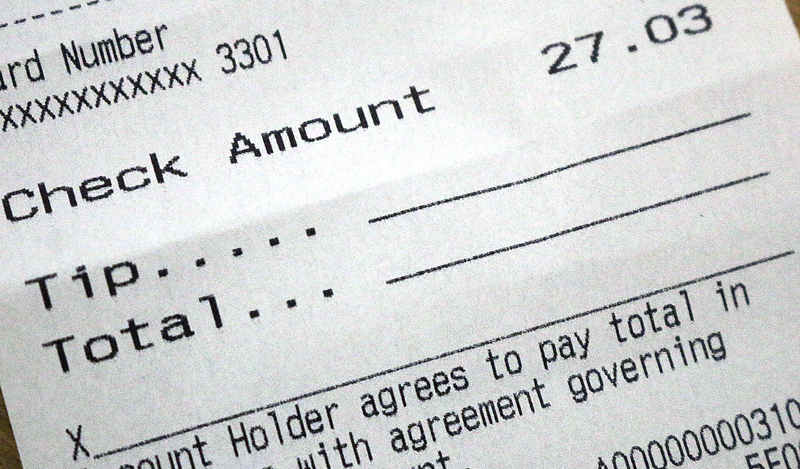The meal had already been paid via the Internet; so all I had to do was head on over to the restaurant to pick it up. This particular restaurant is located near where I am based. Whether I dine in or take the food out to bring home, my experiences there are generally good; and the customer service recovery is usually at least satisfactory whenever an issue arises.
When I arrived at the restaurant slightly earlier than when the food was supposed to be ready, I walked over to the counter where the food is picked up to take out…
An Interesting Conversation About Tipping at a Restaurant Pick-Up Counter
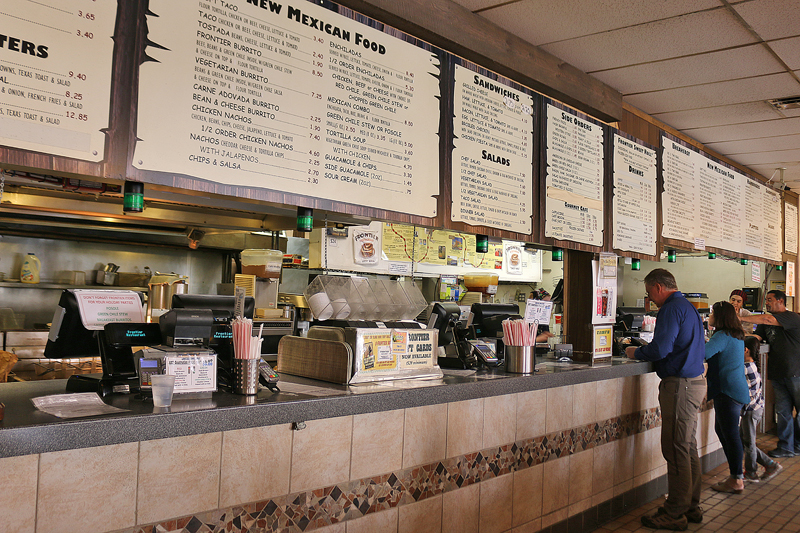
…and after waiting at that unmanned counter for approximately seven minutes, a rather stocky man showed up and asked if I was the person who was ready to pick up the order of what turned out to belong to someone else.
“No,” I replied, informing him of who I was and the food which I ordered — and while I had his attention, I related a couple of issues which I had experienced during the most recent time I picked up food there and to please ensure that they were not repeated this time.
Not only did he seem indifferent to what I had imparted to him; but he handed me my receipt and specifically called attention to the line where a gratuity is optionally added by the customer.
Initially stunned, I thought that was rather tacky. I then drew a line through that part of the receipt; wrote in the cost of the food as the final total without the tip; and signed the receipt. He was clearly in disbelief of seeing what I did.
“I had a bad experience last time from which nothing had been done to correct it,” I told him. I then asked if he could add some sauce to the order while I waited for it.
“I will do my best,” he responded.
I will do my best?!?
The sauce comes in packets. Adding sauce to the bag does not exactly require a substantial amount of effort — and this is where I have an issue. I am at a counter where food is picked up. I am not being served my food on plates. I am not sitting at a table which requires cleaning. I am not using a cloth napkin or any cutlery which must be washed. I did not ask for a complimentary glass of water, as is customarily served at a table. The counter is right next to the busy kitchen; so the walk between the two is several steps at best. No one at the restaurant had to take my order — it was already placed electronically…
…so why in the world would anyone leave a gratuity at a pick-up counter — especially when prompted?
The lack of a gratuity apparently changed his attitude — and not in the way I expected at all. I thought he would be indifferent towards me. Rather, the level of service which he provided suddenly improved noticeably. The sauce was added to the order. He asked me to check the food, which some of it was not prepared properly and was thus corrected. He did other things in a turnaround which may have caused whiplash for some people.
“Is it too late to leave a tip on that receipt?” I asked. He definitely did not expect that. He was now going above and beyond in terms of providing service to me; and I felt that needed to be rewarded. I added the gratuity and handed the receipt back to him.
“I am on my feet all day,” he said, “and I don‘t get paid for it.”
I knew what he meant. He gets paid by management at the restaurant — but not enough for a decent wage; so he apparently relies on tips.
“That is not fair,” I replied. “You should get paid for working. I am against tipping to subsidize compensation to employees.”
“Yeah, well, they do that to keep the prices low,” he said.
“That makes no sense,” I said. “Just raise the prices on the menu.”
“But then the food will be more expensive,” he countered.
“No, it won’t. What is the difference if they raised the prices of the food by 20 percent versus me leaving a tip for 20 percent?!?”
He initially was attempting to argue with me on that point — but he could not.
Think about it: if what he said is true, then restaurants do whatever they can to keep the prices artificially low — using the prices on their menus as a form of trompe-l’œil, or trick of the eye — similar to how lodging companies use similar tactics to present the illusion that advertised room rates initially appear to be low with such tactics as mandatory resort fees charged at individual hotel and resort properties.
Tipping Initially Arrived to the United States From Europe
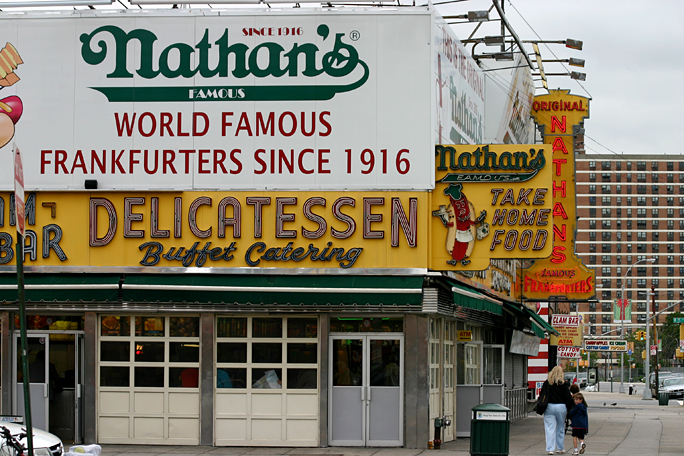
“Tipping is an unmitigated disaster in the USA.” That is the blunt opinion of Nil, who is a reader of The Gate — but although that statement may arguably be true, how did the United States get to this point?
Whenever the controversial topic of tipping and gratuities is brought up, many people will fault it as a chiefly American custom — but that assumption turns out to be erroneous, as the controversial concept of tipping was reportedly first introduced to the United States from Europe back in the nineteenth century, according to the following excerpt from this article which was written by Paul Wachter of The New York Times back on Thursday, October 9, 2008:
Tipping began as an aristocratic practice, a sprinkle of change for social inferiors, and it quickly spread among the upper classes of Europe. Yet even at its outset, tipping engendered feelings of anxiety and resentment. In the mid-1800s, after leaving the Bell Inn of Gloucester, the Scottish writer Thomas Carlyle complained: “The dirty scrub of a waiter grumbled about his allowance, which I reckoned liberal. I added sixpence to it, and [he] produced a bow which I was near rewarding with a kick.”
After the Civil War, wealthy Americans began traveling to Europe in significant numbers, and they brought the tip home with them to demonstrate their worldliness. But the United States, unlike Europe, had no aristocratic tradition, and as tipping spread — like “evil insects and weeds,” The New York Times claimed in 1897 — many thought it was antithetical to American democratic ideals. “Tipping, and the aristocratic idea it exemplifies, is what we left Europe to escape,” William Scott wrote in his 1916 anti-tipping screed, “The Itching Palm.” One periodical of the same era deplored tipping for creating a class of workers who relied on “fawning for favors.”
Opposition to tipping was not limited to the media. In 1904, the Anti-Tipping Society of America sprang up in Georgia, and its 100,000 members signed pledges not to tip anyone for a year. Leagues of traveling salesmen opposed the tip, as did most labor unions. In 1909, Washington became the first of six states to pass an anti-tipping law. But tipping persisted. The new laws rarely were enforced, and when they were, they did not hold up in court. By 1926, every anti-tipping law had been repealed.
Ultimately, even those who in principle opposed the practice found themselves unable to stiff their servers. Samuel Gompers, who was president of the American Federation of Labor and a leading figure of the anti-tipping movement, admitted that he “followed the usual custom of giving tips.”
Meanwhile, Europe was rethinking its devotion to the custom. The 1943 Catering Wages Act in Britain established a minimum wage for service employees that helped decrease their reliance on tips. And in 1955, France passed a law requiring its restaurants to add a service charge (“service compris”) to each bill, a practice that has become the norm for most of the continent. By then, the anti-tipping movement had all but vanished in the United States.
Should You Leave a Tip or Gratuity for Taking Out Food From a Restaurant?
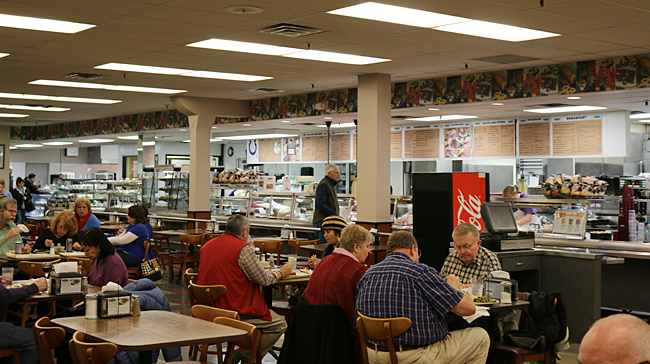
One can argue that because a customer is not served at a table by an actual person — including having the plates, cutlery and cloth napkins washed and prepared, taking the order manually, pouring drinking water when needed, bringing bread and the courses of the meal in more than one trip, clearing the used dirty plates once the meal is finished, and ensuring that the diner is having a good experience — one is not required to leave a tip or gratuity for simply picking up the food in containers, plastic utensils and paper napkins, and taking it out for consumption elsewhere…
…but then again, someone had to ensure that the order was prepared properly and collected together in a conveyance which is easy to carry — such as a bag with handles — and collect what is owed on the bill if it was not already paid in advance when the food was ordered. Perhaps the person handling your order took special care or did something beyond what was expected to ensure that your dining experience elsewhere would be better.
I first asked in this article back on February 24, 2019 as to whether or not you should leave a tip or gratuity — whether or not it is a reduced amount — when you take out food from a restaurant; and what are your reasons regardless of the answer to that question. Answers which were posted in the Comments section of that article from readers of The Gate were mixed, as the topic of tips and gratuities has been a controversial one for years.
“yes I tip at restaurant when I get my food for carry out because we all know restaurant employees are under minimum wage and rely on tips to make their money”, according to this comment which was posted by David Gerard Ralson. “If you’re too cheap to tip people that are making under minimum wage you can always go to a fast food were there paid a minimum wage. We all know people that make with a minimum wage aren’t getting rich so have a heart give a few bucks.”
However, ktc is one of the readers of The Gate who offered a different take on the issue: “No need to tip to-go orders. this is the prevailing politically charged mindset of not to offend or make anyone uncomfortable, regardless of the content of events.”
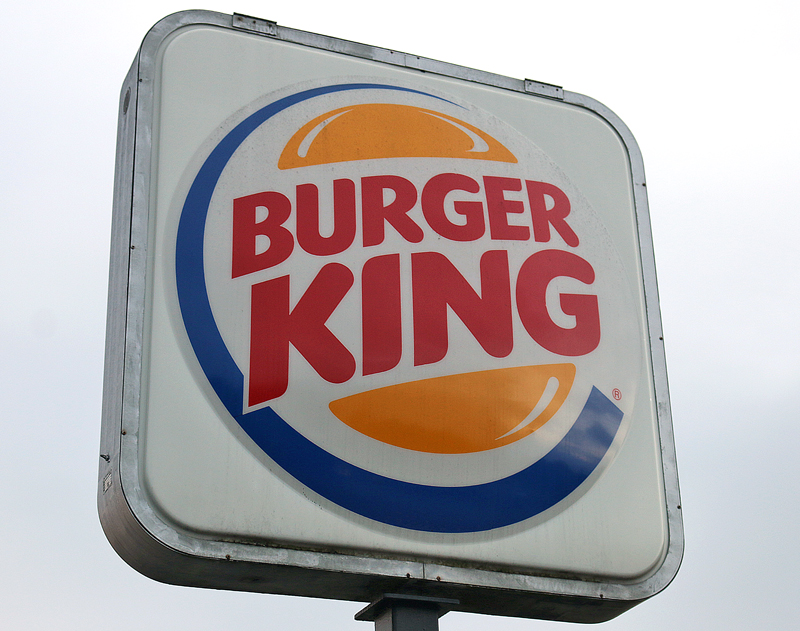
Not seeing any difference in effort expended in preparing food in a fast food establishment versus taking out a hamburger in a restaurant, “Do you tip the cashier at McDonald’s after he places a prepared Big Mac and fries in your bag, not to mention filling your drink order?” Johnny asked. “That being the case, why would you tip the restaurant cashier and not the McDonald’s cashier? They both work for minimum wage.”
He has a point. Would you give a tip for receiving what is shown in the photograph below?
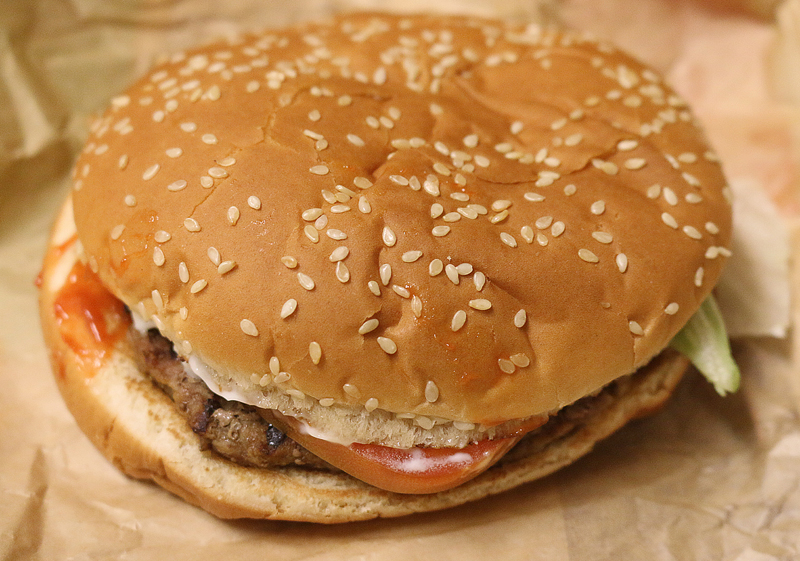
Here is another question for your consideration: should you tip the person behind the counter for taking your order and providing you with your food before you find a table and sit down to dine? Someone must clean the table after you are done. What if a member of the wait staff provides you with a refill or extra napkins but not full service?
Summary
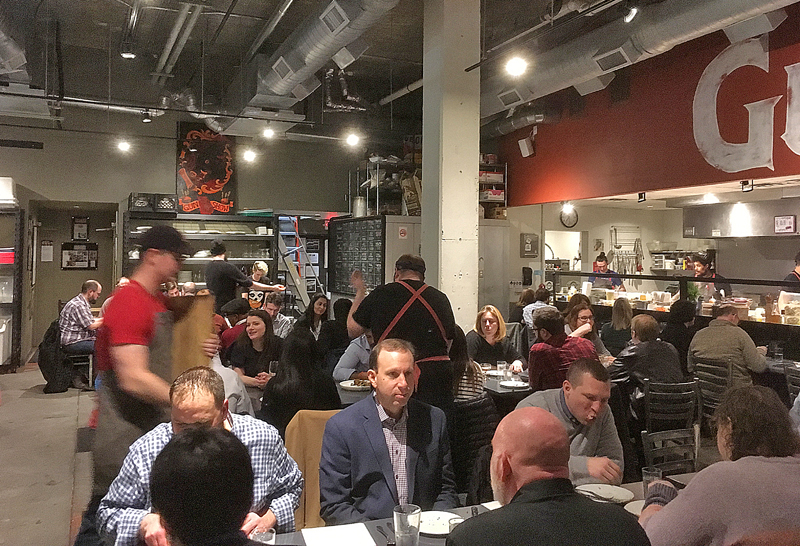
The conversation was an awkward one at best for both the person behind the counter and me. He must have been working reasonably hard because he was sweating and seemed to be short on breath at times; but I can tell that he was uncomfortable with soliciting me for a gratuity, as that can be perceived as a form of begging — and although at times it can be rewarding, I can only imagine that being tipped may at times seem to be demeaning enough to feel a decrease in personal dignity.
As with workers in other industries, employees of restaurants deserved to be guaranteed reasonable compensation for the hard work which they perform in restaurants — and if a customer feels like the person went above and beyond to provide exceptional service, leaving some extra money in the form of a tip should be optional and not obligatory.
The cost of food in restaurants in the United States should be raised enough to cover compensation for employees. Restaurants around the world do this — although many using the guise of the mandatory service charge, which I believe should also be baked into the cost of the food. The practice of tipping is so ubiquitous in the United States that people actually rarely refuse to leave any sort of a gratuity due to bad service. Who walks into a restaurant these days purchasing a meal for $25.00 thinking that is the final price before taxes and gratuities — and perhaps other unexpected fees?
Yet I believe that is exactly what should happen: advertise the total cost of the meal and provide a breakdown of those costs — minimally in terms of taxes and gratuities — for the purpose of transparency to customers. Stop with these games of illusory pricing once and for all — regardless of the commercial entity which engages in what I consider to be deceptive practices. That includes restaurants, lodging companies, and anyone else who willfully engages in this practice.
Gratuities and tips have long been controversial with regards to travel and dining — to the point of contentiousness from all sides of the issue, as evidenced by the following articles which I wrote for The Gate over the years…
- Do You Leave a Tip or Gratuity for Taking Out Food From a Restaurant?
- Should Breakfast Attendants at Hotels Receive Tips and Gratuities From Guests?
- Should Flight Attendants Receive Tips and Gratuities From Passengers?
- Should Customers Pay Servers By the Hour as a New Concept Pertaining to Tipping and Gratuities?
- Should Gratuities and Tips in Restaurants Be Discontinued?
- Tips and Gratuities: Your Thoughts, Please
- How Much Should You Tip Around The World?
- No Tipping Policy Pared Down at One Restaurant Chain
- Comparing Tipping to Paying Taxes? Get Real…
- When Is a Tip Not a Tip? When It is Mandatory
- Hey, Marriott: I Will Tip When I Darn Well Feel Like It
- Should the Practice of Tipping Be Abolished?
- Tipping the Hotel Maid: Yes or No?
- Tip: Charge the Charge to Tip the Tip Separately From Charging the Tip as a Charge
- Bad Service at a Restaurant: Should You Leave a Tip?
All photographs ©2007, ©2014, ©2017 and ©2019 by Brian Cohen.
